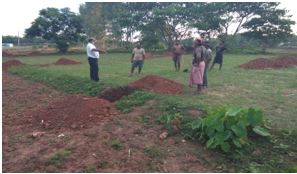MGNREGS- A Glimmer of Hope to Lessen Rural Distress
 The idea of promoting horticulture based durable livelihoods assets in the cultivable wasteland through MGNREGS and Special Central Assistance (SCA) to Tribal Sub Scheme (TSS) has been quite useful as the financial stress is not imposed on the farmer’s family. Rather the wasteland becomes productive and fertile through the constant application of bio-fertilizer and operation inter-culture. Most importantly, farming activities inside the fenced patches ensure immediate cash income for the families. The support of MGNREGS in terms of labor component is an additional earning medium and the farmers can also take up intercrop in the beginning years of intervention. `
The idea of promoting horticulture based durable livelihoods assets in the cultivable wasteland through MGNREGS and Special Central Assistance (SCA) to Tribal Sub Scheme (TSS) has been quite useful as the financial stress is not imposed on the farmer’s family. Rather the wasteland becomes productive and fertile through the constant application of bio-fertilizer and operation inter-culture. Most importantly, farming activities inside the fenced patches ensure immediate cash income for the families. The support of MGNREGS in terms of labor component is an additional earning medium and the farmers can also take up intercrop in the beginning years of intervention. `
 This year, through the agriculture cluster approach, 20 acres of wasteland has converted into cultivable land and used for mango plantation in Brahmaguda village of Kenduguda GP in Boipariguda Block of Koraput district. In this program, around 20 tribal households were covered. A total of 51 job seekers were ensured employment wherein 22 women and 3 migrant laborers got eight weeks’ work engagement leading to leverage of wage to the tune of rupees 5.07 lakh, of which 1.49 lakh under SCA to TSS and 3.58 lakhs under MGNREGS. The major portion of the wages utilized by them was in the agriculture field for procurement of inputs, like paddy seed and fertilizers. The program certainly helped the farmers to come out of their distressed financial situations.
This year, through the agriculture cluster approach, 20 acres of wasteland has converted into cultivable land and used for mango plantation in Brahmaguda village of Kenduguda GP in Boipariguda Block of Koraput district. In this program, around 20 tribal households were covered. A total of 51 job seekers were ensured employment wherein 22 women and 3 migrant laborers got eight weeks’ work engagement leading to leverage of wage to the tune of rupees 5.07 lakh, of which 1.49 lakh under SCA to TSS and 3.58 lakhs under MGNREGS. The major portion of the wages utilized by them was in the agriculture field for procurement of inputs, like paddy seed and fertilizers. The program certainly helped the farmers to come out of their distressed financial situations.
Rounds of meeting and focus group discussions were taken up with tribal households for taking up this initiative. CYSD-FADP team has facilitated household-level activity plans, processing of individual applications with requisite documents, and seeking approval from the district administration. Further, all activities were incorporated in MGNREGS Plan for leveraging resources. The project team continued to provide handhold and technical support in collecting saplings, manure, and green-net for tree guard. Besides, the team has ensured the timely availability of inputs and payment. The experts have been facilitating regular interactions with different stakeholders, like beneficiaries, PRIs, block, and district officials for the success of the program and release of wage payment under MGNREGA.
The major outcomes of this intervention are, plantation of 800 mango plants in 20 acres of wasteland, being the farmers’ durable assets, will provide sustainable livelihoods and contribute to reducing carbon substantially. Intercropping in 16 acres of land with millet and horse gram will not only help the beneficiaries generate better livelihood options but also convert the entire habitat eco-friendly. Mainstream program support in terms of land development will offer fruits and shades, afforestation will trigger water resources alive and make water facilities available to the villagers around the year.
